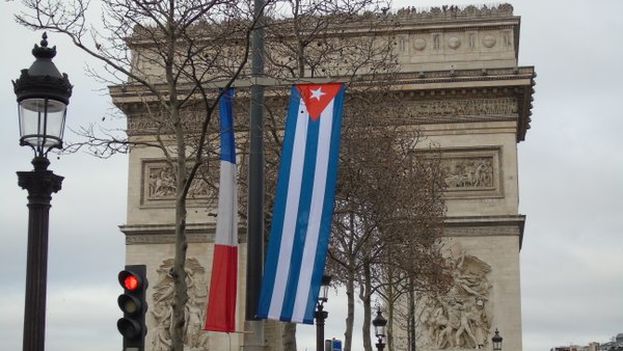
![]() 14ymedio, Havana, 1 February 2016 – Raul Castro’s current visit to Paris is receiving widespread coverage in the French press, focused on the possibilities offered by Cuba’s appearance in the international market. The island is considered the new El Dorado by many of the publications that trumpet the advantages of investing in a place with a privileged geographical position and where almost everything remains to be done.
14ymedio, Havana, 1 February 2016 – Raul Castro’s current visit to Paris is receiving widespread coverage in the French press, focused on the possibilities offered by Cuba’s appearance in the international market. The island is considered the new El Dorado by many of the publications that trumpet the advantages of investing in a place with a privileged geographical position and where almost everything remains to be done.
Jean-Christophe Dauphin, from the private equity company AGSM, was enthusiastic about a recent trip to Cuba during an interview on radio Europe 1. “I was there in July for ten days, and it is evolving very very quickly. The last day I was in Havana I ran into Brazilians, Austrians… the whole world is in the race. One will have to have sharp elbows not to drown in the middle of the mass,” he said.
Appearing on the same radio station was former Secretary of Foreign Trade Pierre Lellouche, now a deputy for the Union for a Popular Movement party (UMP), who praised Raul Castro’s visit to France and the leadership he has taken in his country in this regard. However, he stressed that to date trade with Cuba is negligible, “It is about 200 million euros a year, that is, nothing.” Lellouche added that France must support the island in moving forward “toward democracy and human rights.”
L’Express published a comprehensive report in its employment section on French investments in Cuba and again called it the Island of El Dorado. “Cuban labor is highly skilled,” according to Didier-Pier Florentin, of Havana Development, who is quoted in the article. The sectors with the least presence and, therefore, greatest opportunities, are energy, tourism, transportation and the internet, according to the French publication. Stéphane Witkowski, president of the Institute of Latin American Studies, emphasizes the importance of the geographical position of the island: “Cuba occupies a strategic position, especially for companies who want to get into other Latin American markets.”
The international prestige of Cuban medicine, which the government has exported for decades, has led France to be particularly attracted to that sector. The DMS Group, which specializes in high technology for diagnostic medicine, is particularly interested in investing in this area, the second highest source of exports from the island, after nickel.
“We are about to finalize an agreement with a Cuban company for the distribution of our products,” revealed Samuel Sancerni, Deputy CEO of DMS. “Our goal is to position ourselves in the market before the United States reaches Cuba,” he adds.
Another French company, Abivax, born from the merger of three laboratories, was a pioneer in proposing an alliance with Havana in 2014 in biotechnology, with the goal of becoming the world leader in vaccines.
In an interview published Monday in the Catholic daily La Croix, the Cuban writer Jacobo Machover says that despite the enthusiasm displayed by the international press, the human rights situation in Cuba has worsened since the restoration of diplomatic relations with the United States. And, he added, “there is no will to change on the part of the regime.”
The writer, who lives in France, points out that there are strong limits on freedom of expression and on access to the internet, and that visits by heads of state such as Hollande or Italy’s Matteo Renzi, “consolidate and legitimate the Castro dictatorship.”
Machover believes life for the Cuban people has changed very little since US President Barack Obama’s announcement in December 2014. “There is a wave of emigration that has gone unnoticed in the media, but that is of very large proportions,” he explains. “This is the largest exodus since the Rafter Crisis in 1994.”
At 5:00 pm, Paris local time, there will be a demonstration at Champs-Elysées-Clemenceau Metro Station, called by a group of intellectuals through a manifesto entitled “Against Raul Castro’s visit to France.” The manifesto is signed by Machover, Laurent Muller, president of the European Association for a Free Cuba, Jesús Zúñiga, a refugee Cuban independent journalist, the writer Zoe Valdes, and journalist Bernard de la Villardière, all of whom live in the French capital.
